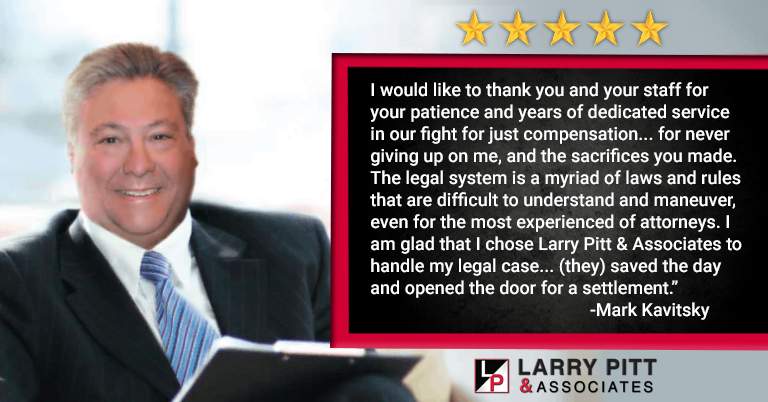Recovering
$ MILLIONS
For Injured Workers
Workers Compensation Lawyer in Springfield, PA
Getting Help for Workers’ Comp Claims in Pennsylvania: Call A Workers Compensation Lawyer in Springfield, PA Today

Workers who suffer from a work-related illness or injury may be faced with the loss of wages and costly medical bills. However, Pennsylvania law helps injured or ill workers by providing workers’ compensation benefits to help cover the financial losses that can occur as a result. Fault does not need to be proven for workers’ compensation claims, and you can recover even if you were partially at fault. Rather than fault, claimants must prove that the injury or illness is related to employment. While this sounds like a straightforward process, and it can be for some individuals, the attorneys at Larry Pitt & Associates know that is not always the case.
Some injured workers may have a very difficult time recovering the compensation that they deserve. In fact, they may even have their otherwise valid claims denied. Some of the most common grounds for denial include the following:
- Improper or incomplete application
- Failure to give notice to an employer within 21 days of an injury or illness
- Failure to file a claim with the WC carrier within 120 days of an injury or illness
- Inadequate medical support with your application
- Pre-existing injuries that are blamed for your disability
- Failing to respond to the WC adjuster for information
- Independent medical examiner disagreeing with the cause of your injury or illness
- Inaccurate information in your application, and
- Many other mistakes that could be avoided with an experienced workers’ comp lawyer in Springfield, PA.
GET A FREE CONSULTATION WITH LARRY PITT
Get Help With Your Claim. Contact An Experienced Springfield Area Workers Compensation Lawyer Today.
If you need help with your workers’ comp claim after it has been denied, or if the amount of compensation you have been awarded is significantly lower than it should be, you should call an experienced workers’ compensation lawyer in Springfield, PA. It does not matter where you are in the process of applying, Larry Pitt & Associates can help you complete our WC claim and obtain the compensation that you deserve.
Learn more about our law firm and how we can help you by scheduling a FREE consultation with our team by dialing (888)-PITT-LAW or (877) 748-8529, or by sending us a message through our easy-to-use contact us box available here.
How Does Filing a Workers’ Compensation Claim Work?
After you have been injured or suffered from an illness that is due to your workplace, there are two things that must be done in order to officially file a claim. The first thing that you need to do is notify your employer of your work-related illness or injury. Typically, you only have 21 days from the date of the work-related injury or illness to notify your employer.
Once you have notified your employer, you have 120 days to file a claim with the workers’ compensation carrier. From there, you may have to have an independent physical examination, answer requests for evidence, or be interviewed.
Can I Sue My Employer For a Workplace Accident As Well?
No, not usually. Being able to sue your employer for a workplace-related illness or injury is rare. This is because workers’ compensation is often referred to as the “exclusive remedy” for all work-related illness and injury claims. However, there are a few instances in which you may be able to sue your employer for a work-related injury or illness. These circumstances include the following:
- You tried to file a formal workers’ compensation claim, but your employer failed to file your claim
- Your employer did not have workers compensation insurance but was required by law to have it
- Any intentional harm such as assault caused by your employer
- You were given an assignment that was inherently and exceptionally dangerous and almost certain to cause serious harm such as dismemberment or death
- Other conduct that may fit a rare exception to the rule.
What Our Clients Say














